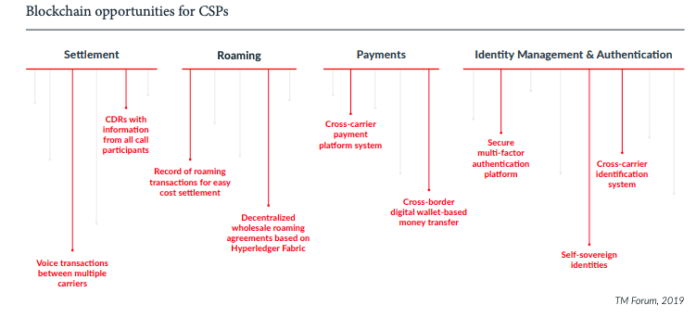A closer look at some more recent advances in blockchain adoption made by CSPs
Blockchain, a technology that establishes a shared, immutable record of transactions within a network, has been on the radar of communication service providers (CSPs) for some time now, and according to an Accenture survey, that interest is only increasing. The survey, which looked at executives from across 20 industries and 27 countries, found that 19% of communications industry respondents ranked distributed ledgers/blockchain as the technology they expect to have the greatest impact on their organizations over the next three years.
Communication providers have already begun looking into revenue growth opportunities derived from blockchain with some promising areas including digital identity management, in which end users control access to their personal information, while the CSP acts as trusted authorities for the user’s identity; IoT disintermediation that leverages the existing involvement of CSPs in the IoT ecosystem and delivers a value-added trust capability through digital identity validations; and the management of cross-carrier payments via blockchain, which allows CSPs to facilitate rapid, secure, variable-sized payments.
Below is a closer look at some more recent advances in blockchain adoption made by CSPs.
Blockchain-based roaming service
Earlier this week, Deutsche Telekom, Telefónica and Vodafone finalized a trial for the automated settlement of roaming discount agreements using a solution developed by blockchain-based settlement company Clear, an Israeli-based company whose $13 million Series A investment received participation from Telefónica and Deutsche Telekom earlier this year.
Clear’s Co-Founder and Executive Chairman Eran Haggiag commented at the time of the blockchain roaming service announcement that “leading industry bodies such as the GSMA and the GLF are now pushing for industry adoption [of blockchain] across multiple use cases.”
The trial dealt with a settlement for roaming data from the three providers for 2019, and provided benefits to the operators such as the ability to obtain yearly settlement results in minutes rather than hours, uncovering data discrepancies visible to both sides in real-time and the ability to update or correct data instantaneously.
Additional benefits for telecom companies of Clear’s blockchain solution highlighted in the press release included faster revenue recognition, lower capital costs and higher speed and efficiency.
In summation, Haggiag stated that the solution will “eliminate the complexity and streamline the process of B2B settlements.”
And that reduction of complexity, according to Deutsche Telekom’s Vice President Commercial Roaming Services Johannes Opitz, is critical, especially in the emerging 5G and Edge ecosystem.
“Roaming discount agreement reconciliation is a complex, costly process prone to errors. Having an automated system that can not only solve this problem, but avoid it altogether, opens up a world of possibilities for telecom companies, as we move from isolation to collaboration,” he said. “Using Clear’s solution, operators will now have the ability to transact seamlessly with an ecosystem of partners — a crucial ability in the 5G and Edge ecosystem, in which we foresee significant growth of operators’ business relationships and business models.”
Blockchain-based mobile phone insurance claims service
Last week, SK Telecom and LG U+ announced the launch of a blockchain-based mobile phone insurance claims service that will process pay-outs without submitting paper documents. Called “Initial Mobile Phone Insurance Compensation Service,” it processes claims by retrieving documents directly from the service center.
This announcement comes only two weeks after the SK Telecom’s commercial launch of a blockchain-based digital identity app, developed with telecom companies KT and LG U+, called “Pass”, which enables verification of the user’s driving license to enable authentication for different services.
The more recent blockchain launch speeds up insurance claims by issuing the repair statement and receipts as a digital document, which is then directly sent to the insurance company for review.
For costumers, this means reduced pay-out timelines, and for insurers this means more trustworthy claims, as they are secured and verified by blockchain’s immutability.
SK Telecom said it will begin implantation of the solution first on its Samsung mobile devices and will add additional phone manufacturers to the ecosystem at a later time.
LG U+ is offering the service to Samsung and LG mobile phone owners.
Global mobile payments using blockchain
Global blockchain consortium of telecom carriers, the Carrier Blockchain Study Group (CBSG), announced in February that Taiwan-based Asia Pacific Telecom (APTG) and an unidentified U.S.-based carrier completed Proof-of-Business mobile payment transactions enabled by TBCASoft’s Cross-Carrier Payment System (CCPS) platform.
Developed with the aim of creating the largest open payment network in existence, the CCPS platform enables cross-border transactions and interoperability for mobile payment solutions globally.
What this looks like in action is that one carrier’s customers are able to use a mobile phone for payment transactions in another country while roaming. Specifically, in December 2019, mobile subscribers from the U.S. carrier visiting Taiwan used their mobile payment app to complete purchases at a participating merchant while on APTG’s payment network, which is connected to the larger CCPS network.
CCPS enables the transactions to be conveniently billed and paid through direct carrier billing in the purchaser’s home-currency.
“CCPS works as a highly trusted and robust platform to connect carriers and Over-The-Top (OTT) payment networks into one large open-loop global payment network, creating synergy for both by matching a carrier’s subscribers with OTT merchants,” Ling Wu, founder and CEO of TBCASoft, and co-chairman of the CBSG Consortium.

